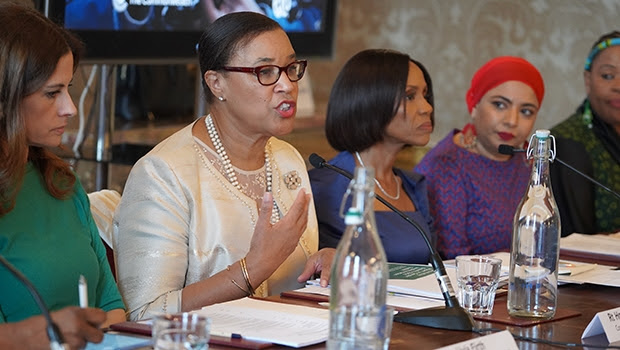A COMMONWEALTH event has called for an end to gender inequality by 2030 so every girl can have the same opportunities as boys.
Ahead of International Women’s Day, Commonwealth Secretary-General Baroness Patricia Scotland joined a gathering of leaders, celebrities, academics and activists in London to discuss ways to accelerate progress.
Despite decades of activism and reforms, only six countries in the world give women and men equal rights to work in their law books – an increase from none about 10 years ago.
Women’s empowerment
Baroness Scotland told country representatives at the meeting: “Our Commonwealth Charter speaks of gender equality and women’s empowerment as being essential components of human development and basic human rights.

“Advancing women’s rights, the education of girls and their participation in the workforce are critical prerequisites for effective and sustainable development.
“For instance, on average, for every £1 invested in a business, those with all-male boards show a loss of two per cent, while those with two or more women yield a return of six per cent.
“But many countries need help to make it happen. So today, we are consulting on a toolkit that will support country-level efforts with training programmes and campaigns to accelerate gender equality.”
Sharpened focus
She declared the month of March as Commonwealth Gender Equality Month to “sharpen the focus on the need to accelerate the rate at which action is taken by our member nations to achieve gender equality”.
Delegates at the meeting watched a new film that follows Livia Firth, co-founder of Eco-Age, to Botswana.
Advancing women’s rights, the education of girls and their participation in the workforce are critical prerequisites for effective and sustainable development.
Baroness Patricia Scotland
In the film, she listens to women who have improved their living standards by working in Botswana’s diamond industry.
Following the film, a panel consisting of The First lady of Botswana Neo Masisi, Baroness Scotland, Livia Firth, and Baroness Lola Young discussed how diamonds have contributed to the sustainable development of Botswana uplifting communities and protecting the environment.
Positive change
Masisi said: “Botswana’s economy transformed from one of the poorest countries in the world to a middle-income country in Africa where the discovery of diamonds has played a pivotal role in creating sustainable growth and development in Batswana’s livelihoods.
“Botswana has managed where many others have failed to translate the potential resources below ground into enduring value above ground.”
The Secretary-General also launched a toolkit, developed in partnership with the NO MORE Foundation, that will help implement the sustainable development goal five for gender equality.
The new toolkit aims to provide guidance on devising culturally sensitive training programmes, bystanders intervention initiatives and motivational campaigns to bring about positive change more swiftly, including challenging gender-based violence.


Comments Form